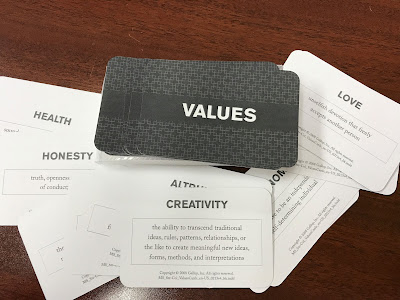People exceptionally talented in the Belief theme have certain core
values that are unchanging. Out of thee values emerges a defined purpose for
their lives.
Clifton StrengthsFinder
People high in Belief have unchanging values. The specific
values are dependent on the individual themselves, but in each case, they frame
how that individual acts, thinks, and decides. People with Belief may not
necessarily be religious or spiritual people, but their values shape their
lives. Because their values are unchanging, people see those with Belief as
reliable and enduring. Their values help bring purpose and focus to even the
most menial of work.
These values give passion and drive to individuals, allowing
them boundless energy around the non-negotiables. In my coaching course, I met
a preacher from Tennessee named Rodney. He has high Belief and detailed to me a
story of a young kid in his church. This boy’s dad had an unhealthy control
over him and was preventing him from going to school. When Rodney found out, he
gathered others in his congregation and spent the next two weeks working on a
detailed plan to remove him from the home and relocate him to allow him
opportunity for education. Rodney said that he could not even sit in meetings,
sit down for dinner, or spend time in casual conversation because his mind was
so focused on the welfare of this young boy. Rodney’s values of education and
caring for the next generation were so strong that they overcame his own basic
needs as a human. His Belief gave him boundless energy to care for this
child.
11.8% of our mentees and 21.9% of our mentors have Belief in
their Top 5. Regardless of whether you have Belief in your Top 5, consider
framing conversation around your values as individuals. There is an activity
idea I would like to share with you that revolves around how our strengths and
values relate to one another, something that someone with Belief will be able
to explain well. The exercise, entitled “Maximizing Your Values” utilizes
Gallup’s value cards. They can be purchased here at the Gallup
store for $4, or you can create your own using paper and a list of values like this one. First, divide the
values in two piles; those values that are “core” values [ones that define you
without question] and those that are “negotiable” [not at all or somewhat
important to you]. Then, with your core
values pile, narrow the list down to your top 5 values, in no particular order.
Then, with your top 5 values in front of you, journal to yourself [as I did
below] or talk aloud to each other, asking the question, “How do my signature
strengths themes influence or activate my core values?” Your values and your
mentee’s values will be different, ensure you do not place judgement on their
core values, but instead open the way for honest conversation about how your
values shape who you each are. By having conversation about what matters most
to us, you and your mentee will be able to pull away for just a bit from the
busyness of life, to see your greater purpose.
-Tess



Comments
Post a Comment